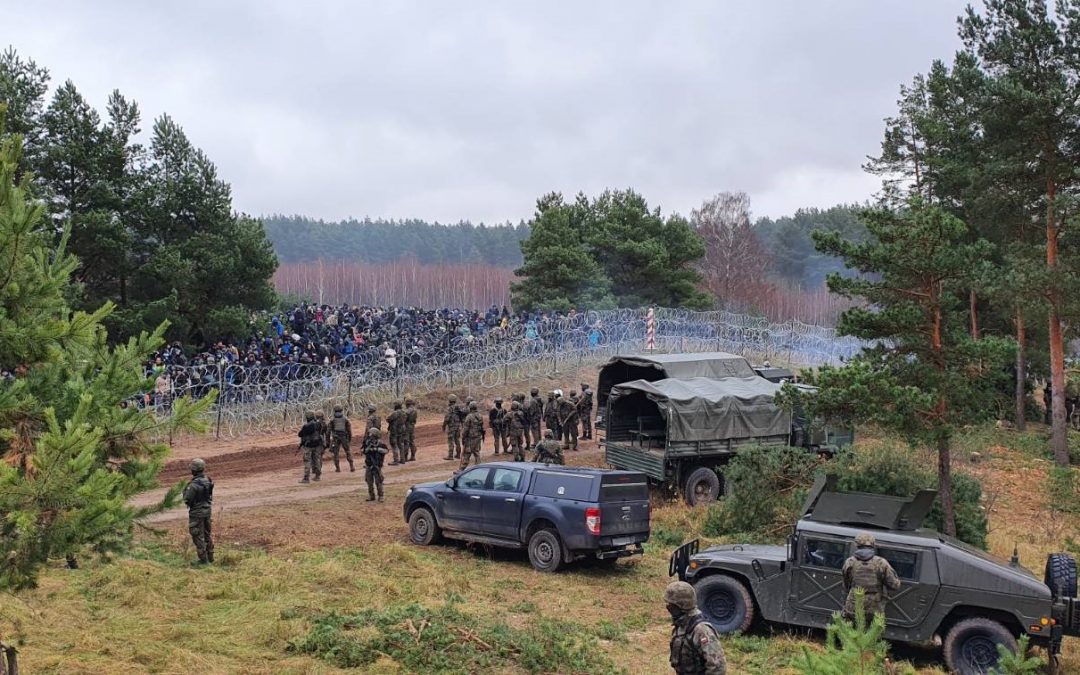Four Syrians who applied for international protection in Poland left the country once they were transferred from a closed detention centre to an open one, says the Polish border guard, which stresses that this is not the first time that “procedures were exploited [by asylum seekers] to travel illegally to the West.”
The men were moved to a facility with lower security levels – where they could leave and come back to the premises freely – after they staged a hunger strike against conditions in the original detention centre where they were being held and the lack of progress in processing their cases.
Some refugees at their former centre in Lesznowola are still on a hunger strike that began over a month ago. Human rights groups say that it is not surprising they seek to flee Poland at the first possible opportunity given the conditions they are held in.
“It is not the first time [that] refugees submit their application for [international] protection and declare that they want to lead a normal life but after a couple of days they are gone,” Anna Michalska, a Polish border guard spokeswoman, told the Polish Press Agency (PAP).
Launching protests has become a way to facilitate their departure from Poland, said Michalska, adding that the refugees are unwilling to negotiate and simply want to leave the closed centres. “It [then] turns out that they want to get to open centres only to travel to Germany.”
The Syrian nationals in question – who are among the thousands of people from the Middle East to have crossed into Poland from Belarus since last year – started refusing to come for meals in late April. On 5 May they were moved to an open centre and on 11 May they “were not in Poland anymore”, said Michalska.
1/3 Obywatele Syrii,którzy przebywając w ośrodku w Lesznowoli,ogłosili pod koniec kwietnia,że prowadzą protest głodowy, zostali przeniesieni do otwartego ośrodka. Po kilku dniach wyjechali z Polski,chociaż ubiegali się o ochronę międzynarodową w naszym kraju.#ośrodekLesznowola👇 pic.twitter.com/Id8DzcDN5h
— Straż Graniczna (@Straz_Graniczna) June 6, 2022
Kalina Czwarnóg from the Ocalenie Foundation, an NGO that helps migrants and refugees, told Notes from Poland that asylum seekers being held in Polish detention centres do often “flee as soon as they can”.
But “after the hell made for them by the Polish border guards in the forest and later in the centres”, she says she cannot blame them. “If I were in their shoes I would leave a country that’s using violence against me the first chance I would get.”
Another activist – who asked to remain anonymous – from Grupa Granica, another aid NGO, shares Czwarnóg’s assessment. “They have left because they couldn’t imagine functioning in Poland anymore,” he told Notes from Poland.
“From the point of view of these men, Poland is a county that doesn’t respect their rights: they were welcomed with guns at the border, brought to a detention centre with unacceptable conditions, and where their rights were not respected,” he adds.
The office of Poland’s commissioner for human rights, a state body, has also documented and condemned the “unacceptable” conditions in detention centres for asylum seekers. Last month it issued a report noting that the “humanitarian crisis on the [Belarus] border continues”.
The Polish authorities, however, argue that conditions at the facilities meet legal requirements and respect the needs and rights of those detained. They also argue that closed centres are needed in many cases due to security risks presented by some who have crossed the border
The government has also taken a tough approach at the border itself, including banning all non-residents – even journalists and NGOs – from the area and building a wall. It has often pushed border crossers back into Belarus, a policy that has in two instances been found by Polish courts to have violated the law.
Main image credit: 16 Dywizja Zmechanizowana/Flickr (under CC BY-NC-ND 2.0)

Agnieszka Wądołowska is deputy editor-in-chief of Notes from Poland. She is a member of the European Press Prize’s preparatory committee. She was 2022 Fellow at the Entrepreneurial Journalism Creators Program at City University of New York. In 2024, she graduated from the Advanced Leadership Programme for Top Talents at the Center for Leadership. She has previously contributed to Gazeta Wyborcza, Wysokie Obcasy and Duży Format.




















